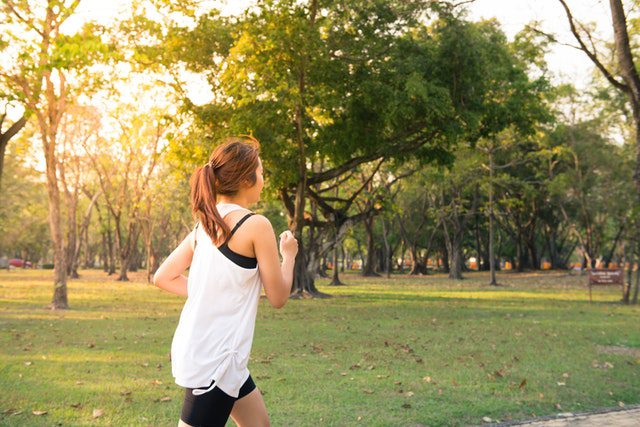Everyone wants to get a great night’s sleep. You want to wake up refreshed, energized, and ready to tackle the day ahead.
But for too many of us, waking up is a chore in and of itself. You wake up feeling slow, groggy, and in dire need of caffeine to kick start your day.
Quality sleep has so many benefits to our overall well-being. We have more energy, better memory, focus and concentration, better athletic ability and recovery, and much more as a result of consistent, long, and uninterrupted sleep.
That’s why it’s so important to focus on improving your sleep quality, and get that great feeling when you wake up first thing in the morning.
Read on for five key tips on getting better quality sleep, and waking up at 100 percent every morning.
1. Develop (and stick to) a routine
The first tip, and for most people the easiest, is to set a clear routine for the times you go to sleep and wake up.
Our body’s internal clock is extremely powerful. It develops a finely tuned sense of when you’re supposed to be asleep, and when you should be awake.
We’re alert and coordinated during wake cycles, blood pressure and heart rate are higher, and certain hormones associated with wakefulness are produced at higher levels.
Also Read: 40 Good Morning Quotes For a Beautiful Day
On the opposite end, our body slows down during the sleep portion of our daily cycle, conserving energy and entering a more restful state.
As long as you go to bed and wake up around the same time every day, your daily cycle (known as the circadian rhythm) should kick into the different gears at the right time. However, the problem becomes when your sleep times vary greatly on a regular basis.
If you go to sleep at 2 am one night, then 11 pm the next, then 1 am the next, your body doesn’t know when it’s supposed to be going into sleep mode.
As a result, you’re likely to feel alert and awake at night – and because your sleep cycle didn’t kick in at the right time, neither will your wake cycle in the morning. You’ll feel groggy, fatigued, and lacking in mental clarity.
The same thing can apply if you wake up at all kinds of different times. Even though you might like to sleep in on your day off, it’s not always best for you if you need to wake up at 6 am every other day.
Set a routine for when you go to bed and wake up, and follow it. You’ll train your body to rest at the right times and sprint at the right times.
2. Get light exposure first thing in the morning.
Our sleep cycle is naturally predisposed for us to be awake during the day and sleep during the night. So light exposure plays a big part in keeping a healthy circadian rhythm, and as an extension, good quality sleep.
After waking, getting exposure to light is a great way to tell your internal clock that it’s time to be alert and active. This will, in turn, put you on track to feel restful, relaxed, and ready to sleep at the right time, later that night.
Neurobiologist Andrew Huberman talks at length about the benefits of early morning light exposure on his podcast, Huberman Lab.
Sunlight is the best type of light to be exposed to because it’s much more powerful than artificial lights you may have in your home. Aim to get outside and get 10-30 minutes of sunlight soon after waking up.
Also Read: Improve Your Health! Get Less Blue Light (& More Natural Light)
3. Avoid blue light in the evening.
Similar to how you want to get light exposure early in the morning, it’s also good to limit how much light you’re exposed to later in the day.
The reasoning is simple – just the opposite of why you want to get early morning light exposure. Viewing bright lights after the sun has gone down tricks the body into thinking it’s daytime. Thus, your internal clock won’t enter its sleep cycle at the right time.
You particularly want to avoid blue light, as light on this wavelength has strong effects on alertness and the hormones that interfere with sleep quality.
Examples of blue light include those from electronic devices (like your phone) and LED or fluorescent lights. Try to avoid these lights close to bedtime – at least for 30 minutes, though the longer the better. You can also try installing blue light blockers on your electronic devices, and switching to softer, warmer lighting at home.
4. Limit caffeine in the afternoon
Caffeine is a tried and tested way to feel more energized, focused and alert. While this is a plus during the day, it’s a problem if you’re trying to get to sleep.
The way caffeine promotes alertness has a direct effect on sleep as well, as long as it’s active in your system. Caffeine blocks the receptors for adenosine, which is a chemical that promotes sleepiness. Adenosine levels naturally build up over the day, resulting in us feeling sleepy the longer we’ve been awake.
Most people don’t take caffeine right before going to bed, which would obviously be a bad idea. But as long as caffeine is still in your system, you can experience the negative effects on adenosine.
Caffeine generally stays active in the body for 4-6 hours after consumption. So drinking coffee or taking any other caffeinated food or drinks later in the day can interfere with sleep quality, even if it’s not directly before bedtime.
Make it a rule to stop caffeine at a certain point in the day (depending on when you usually go to sleep). For most peoples’ sleep schedules, a 2 pm cutoff makes sense. Also, avoid overdoing it with caffeine – stick to 2 cups of coffee max per day.
Limiting your caffeine, and only taking it early in the day, will allow it to be fully processed and out of your system when it’s time to go to sleep.
5. Try a wellness supplement.
Various supplements can also help regulate the processes that interfere with sleep, helping you get to sleep quicker and get better quality sleep.
It’s common to have trouble sleeping if you’re under a lot of stress. This could be emotional, mental, or physical. Managing this stress, and promoting feelings of calm and relaxation before you go to bed, is likely to result in an improvement in sleep quality.
Certain herbs, such as lemon balm extract, have been widely shown to have a calming effect and help with stress, anxiety, and sleep.
Then there are adaptogens, which are natural substances that help manage and regulate stress hormones in the body. By bringing the production of stress hormones (most notable cortisol) to a normal level, you may find you’ll get a more restful sleep, as well as feel more alert in the morning.
Consider trying an adaptogen supplement like Naked Recovery, which also features lemon balm extract to help induce calm.
It’s designed not just for the regulation of stress in a mental sense, but also for the physical stress we feel after a tough workout or a long day at work, which can also lead to trouble with sleep.
Final thoughts
Though we all sleep on time, the quality of sleep we get varies dramatically from person to person.
If you wake up every morning feeling groggy and exhausted, there are probably certain steps you can take to help yourself get a more restful, higher-quality sleep. Most importantly, become aware of how your circadian rhythm functions, and how to maintain a healthy, natural sleep cycle.
You’ll likely find it beneficial to stick to a regular sleep schedule, as well as get light early in the morning and limit light at night.
Additionally, be careful of how much caffeine you consume, and how late you consume it.
And finally, try a natural adaptogen supplement to help your body regulate stress, helping you get in the restful state you need to get long, deep sleep every night.






